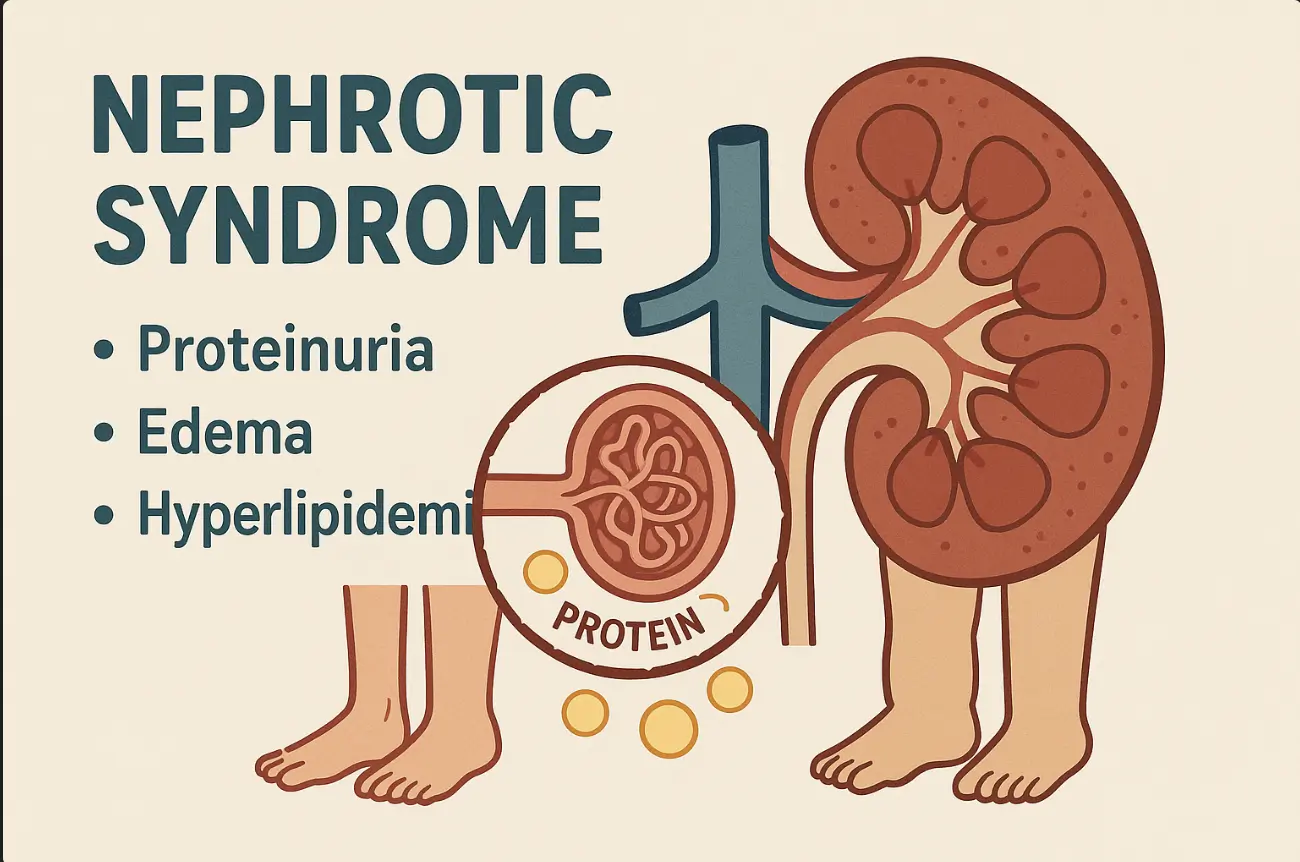What is Nephrotic Syndrome?
Nephrotic syndrome is a health condition where the kidneys start leaking large amounts of protein into the urine. Normally, urine doesn’t have much protein, but in nephrotic syndrome, the filters in the kidneys (called glomeruli) become weak or leaky. This causes protein to leak from the blood out into the urine, making the urine frothy.
Main Symptoms
-
Swelling: Most people notice swelling on their ankles, feet, or sometimes their face. This happens because when protein leaves the blood, the blood cannot hold fluid in the blood vessels. Instead, fluid leaks out into the body, making some parts look puffy.
-
Frothy urine: Urine may look like soap bubbles because of the protein.
-
Feeling tired: Many people with nephrotic syndrome feel weak and lose their appetite.
-
High cholesterol: Blood tests may show high levels of cholesterol.
Why Does Protein Leak in Urine?
In nephrotic syndrome, the main protein that leaks is called albumin. Albumin is important to help keep fluid inside the blood vessels. When albumin is lost, fluid escapes into tissues, causing swelling.
Causes of Nephrotic Syndrome
-
Minimal Change Disease: Most common in children, usually responds well to treatment.
-
Membranous Nephropathy: Common in adults, can be linked to some medicines or infections.
-
Focal Segmental Glomerulosclerosis (FSGS): Causes tiny scars in the kidney filters.
-
Congenital Nephrotic Syndrome: Rare, usually in babies, often requires dialysis or kidney transplant.
-
Sometimes it can happen as a complication of diseases like diabetes, lupus, or as a side-effect of certain medicines.
Checking Kidney Function (Tests)
Doctors use both blood and urine tests to check if kidneys are working well.
-
Blood Tests: Levels of salts (like sodium and potassium), urea, and creatinine are checked. These show how well the kidneys are cleaning the blood.
-
eGFR: This stands for “estimated glomerular filtration rate” and tells how well kidneys are filtering waste from the blood.
-
Urine Dipstick Test: A simple test in the clinic; it checks for protein and blood in urine.
-
Detailed Urine Tests: In laboratories, they measure exactly how much protein, albumin, and other chemicals are in the urine.
-
Kidney Biopsy: Sometimes, a small piece of kidney tissue is taken and checked under a microscope to find out the cause.
-
Other Tests: Early morning urine samples and blood tests to confirm low levels of albumin and kidney problems.
Why Are These Tests Needed?
These tests help doctors:
-
Confirm nephrotic syndrome.
-
Find out what is causing the problems in the kidneys.
-
Track progress and decide on treatment.
Complications
If untreated, nephrotic syndrome can cause:
-
More infections (body loses proteins that help fight germs).
-
Blood clots.
-
High cholesterol, which leads to heart problems.
-
Vitamin D deficiency (bone problems).
-
Sometimes kidney function worsens, leading to chronic kidney disease.
How Is It Treated?
-
Medicines called diuretics: Help remove extra fluid (reduce swelling).
-
Reduced salt in diet: Helps control swelling.
-
Steroid medicines: Help children and some adults get better; these control the immune system.
-
Blood pressure medicines (ACE inhibitors/ARBs): Protect kidneys and reduce protein leak.
-
If the disease doesn’t get better, sometimes treatments like dialysis or a kidney transplant are needed.
Outlook
Many children with minimal change disease recover well after treatment and may never get the disease again. Adults may need long-term treatment and regular check-ups.





